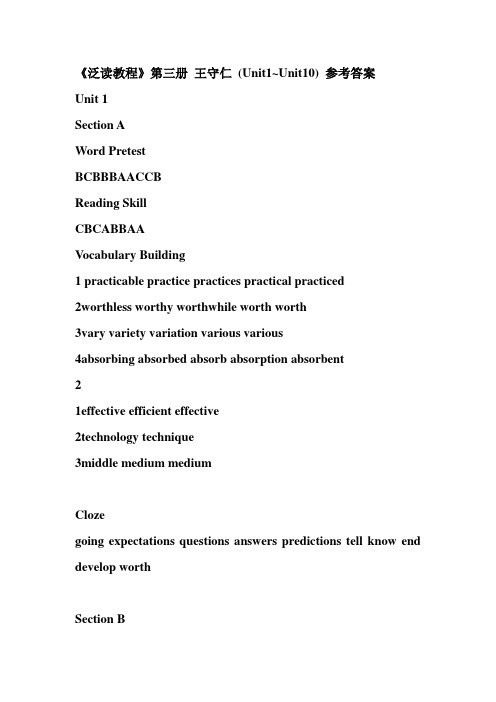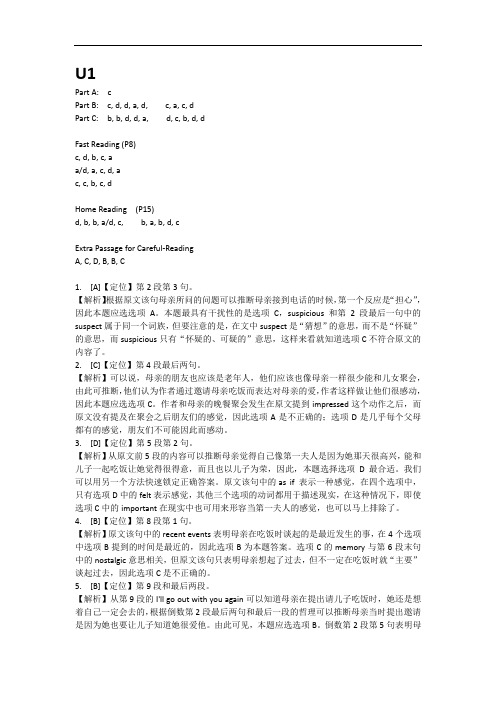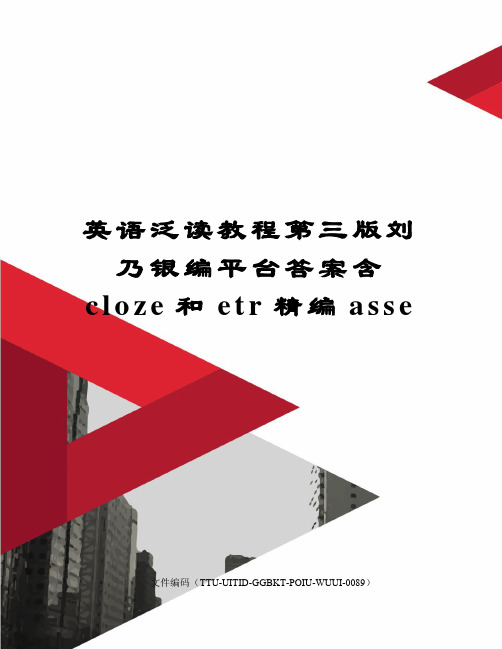英语泛读教程第三版3(主编刘乃银)Extra Passage 4
英语泛读教程3第三版(刘乃银)答案

英语泛读教程3第三版(刘乃银版)答案Unit 1Text:A.cB. bdabb ddc D. addad cdbFast Reading:dbdda abaad cbbdcHome Reading:dacdd aabUnit 2Text:A. bB. ddbcd cca D. badda caacFast Reading:dbbdc bdbdb cddbdHome Reading:cbdcc dbbdUnit 3Text:A.dB. badab bdddc D. bddba cbcaaFast Reading:cbbba ccdda ccdadHome Reading:dbcbd dbdbText:A.cB. ddbcd dc D. abdbb addadFast Reading:dbccd bdadd badcdHome Reading:dadac bcdUnit 5Text:A.cB. abdaa dcbd D. dbabb dabcb da Fast Reading:caabd cbddc cdbabHome Reading:bccdb dcUnit 6Text:A.bB. cbcab ddad D. badaa cbaac Fast Reading:cabcd aadcb ccdabHome Reading:ccdcd abcUnit 7A.dB. acbda dcaac D. abaac daccd ad Fast Reading:daada cddbc bdcdbHome Reading:cbadb cddbcUnit 8Text:A.cB. cddcc dccb D. abdac aaaFast Reading:ccacd bbdad babddHome Reading:dbdbc cbcdUnit 9Text:A.cB. bccbc dbba D. dcbab dacba c Fast Reading:dcbca bccbc bcdddHome Reading:dcdca bdUnit 10Text:A.cB. cdccd bacac D. dcdbc acadc bd Fast Reading:dbdcc dccdb bddcaHome Reading:cadcb acbbUnit 11Text:A.dB. adacc dcb D. abacb dcaab adc Fast Reading:dcdab ccbda ccbcaHome Reading:bcadb bcdddUnit 12Text:A.bB. bbbdd ccc D. cdccd acdba dca Fast Reading:bbddc dbdbc cdcddHome Reading:bcdcc badbb cUnit 13Text:A.cB. cdcad bab D. cbada cabdbFast Reading:cdacc caccd bdbdbHome Reading:bdbcc bddUnit 14Text:A.cB. ddcad dab D. dacad babad bFast Reading:ddabb bddca dcccbHome Reading:cdcda ddUnit 15Text:A.cB. abbac bccdb b D. babcc aaacd bb Fast Reading:caccb accdc ddadaHome Reading:cdacd ddc。
【刘乃银】英语泛读教程4第三版课文翻译

【刘乃银】英语泛读教程4第三版课文翻译英语泛读教程4 第三版主编:刘乃银Unit1天才与工匠许多人羡慕作家们的精彩小说,但却很少有人知道作家们是如何辛勤笔耕才使一篇小说问世的。
以下的短文将讨论小说的酝酿过程,以及作家是如何将这小说雕琢成一件精致完美的艺术品。
有一次,我在暮色中来到小树林边一棵鲜花盛开的小桃树前。
我久久站在那里凝视着,直到最后一道光线消逝。
我看不到那树原先的模样,看不见曾穿透果核,能崩碎你的牙齿的力量,也看不到那使它与橡树和绿草相区别的原则。
显现在我面前的,是一种深邃而神秘的魅力。
当读者读到一部杰出的小说时,他也会这样如痴如狂,欲将小说字字句句刻骨铭心,不提出任何问题。
但即使是个初学写作者也知道,除那将小说带到世上的文字之外,还有更多的构成小说生命的因素,小说的生命并不始于写作,而始于内心深处的构思。
要创作出有独创性的作品,并不要求懂得创造的功能。
多少世纪以来的艺术、哲学及科学创造都出自人们的头脑,而创造者也许从未想到去关注创造的内在过程。
然而,在我看来,对创造工作一定程度的了解,至少会使我们通过知道两个事实,增长我们处理正在出现的故事的智慧。
首先,天赋不是掌握了技艺的艺术家独有的特性,而是人脑的创造性功能。
不仅所有对技艺的掌握都含有天赋,而且每个人都具有天赋,无论他的天赋发展是何等不充分。
对技艺的掌握是天赋的显现,是经过培养的,发展了的和受过训练的天赋。
你的天赋在最原始的层面上起作用。
它的任务就是创造。
它是你的故事的创造者。
第二,将你的小说带进世界的文字是艺术家的工作,它就和一个泥瓦匠的工作一样,有意识、谨慎而实实在在。
天赋正如理解力、记忆力和想象力一样是我们的精神禀赋中的天然部分,而技艺却不是。
它必须通过实践才能学到,并要通过实践才能掌握。
如果要使在我们内心深处浮现的故事跃然纸上,光彩照人,那么,每个故事都须有感染力极强的优雅文笔。
只有健全的技艺才能使我们做到这一点。
一个故事是如何酝酿成的呢,据说,我们从一生中的前二十年,或许前五年起就开始写作。
英语泛读教程3第三册Unit4课文翻译

寻找可以依靠的坚实臂膀在美国,越来越多的老人独居。
他们生病时处境通常显得很悲惨。
简·格罗斯在下面的文章中指出这些老年人的问题。
每次人们在医生办公室给格雷斯·麦凯比递来一份紧急情况联系人表格时,空格处总令她心中发怵。
对任何有配偶、伴侣或子女的人来说,这是个很简单的问题。
但是,75岁的麦凯比女士一直独居。
谁能和她一起渡过难关?情况最糟糕的时候,谁会关心她?这些曾是假设的问题。
但是现在,麦凯比女士视力越来越差,几乎完全看不见。
她一直有很多朋友,但从没请过谁为她负起责任,比如,接急诊室半夜来的电话,或因为她自己不能写支票而帮助付账单。
她在所有的朋友中,选定了一个心地善良、遇事不慌、有解决问题能力的人。
所以,她多次在空白处写止“夏洛特·弗兰克”,然后打电话说,“夏洛特,又把您写在单子上了,”于是,紧张时刻得到缓解。
麦凯比女士被一个鲁莽的司机撞倒在人行横道上,得了脑震荡,这时,年龄70岁,自己也独居的弗兰克女士在起居室长沙发上守了一夜。
麦凯比女士再也看不清标)隹字体时,弗兰克女士给她弄了一台电脑,把字体设置到最大,这样,她就能读报纸,从商品单定购货物。
“你会发现,有些好朋友成了至交,”麦凯比女士说,“夏洛克既实际又形象地告诉我要,抓住不放,我这样做了。
”无法统计出不同年龄生病或有残疾的独居者的数字,医院安排出院的人和家庭健康照料机构说,他们服务的明显无人照顾的独居者越来越多。
人口调查报告中,单人家庭,包括从未结婚者、离婚者和丧偶者,其数目明显增加。
2003年,近27%的美国家庭由独居者组成,高于1970年的18%,这些家庭注重的是不具有亲属的法律地位或社会地位的友谊。
人口统计学家警告说,生育高峰期出生的人老年化,疾病和残疾成为老年不可避免的必然结果,这将使独居者家庭队伍壮大。
美国医院协会资深副会长詹姆斯·本特利说,独居者属于最棘手的情况。
他说,任何病人或残疾人,在医院里和出院后都“需要有人负责照料他们”,但独居者在特别脆弱的时候,却是自己照料自己。
《泛读教程》_第三册(Unit1~Unit10)

《泛读教程》第三册王守仁(Unit1~Unit10) 参考答案Unit 1Section AWord PretestBCBBBAACCBReading SkillCBCABBAAVocabulary Building1 practicable practice practices practical practiced2worthless worthy worthwhile worth worth3vary variety variation various various4absorbing absorbed absorb absorption absorbent21effective efficient effective2technology technique3middle medium mediumClozegoing expectations questions answers predictions tell know end develop worthSection BTFTT CBCC TFF CAACCASection CFFTFFTTTUnit 2Section AWord PretestABACCABABCCReading SkillCBB FTFFTTVocabulary Building11mess 2preference 3aimlessly 4remarkable 5decisive 6shipment 7fiery 8physically 9action 10housing21aptitude attitude2account counted counted3talent intelligenceClozeother just has some than refuse see that without if ready wrongSection BACCCCCCCACBABASection CCCDDACUnit 3Section AWord PretestABCCBDCDCReading SkillBABCAACBCVocabulary Building1Admission admit admissible admissiblyReliance rely reliable reliablyDefinition define definite definitelyAssumption assume assumed assumedlyBehavior behave behavioral behaviorallyVariety vary various variouslyPart part partial partiallyManager manage managerial manageriallyCorrelation correlate correlative correlativelyAdaptation adapt adaptive adaptively21inspired aspired inspired2token badges token3contemporaries temporary contemporaryClozeCommunicate ways using in of message meet causes meaning to eyesSection BBABBAC FFTTTF CCBSection CBBDDBCCA FFTFFTUnit 4Section AWord PretestCACAABBBCCReading SkillBBACBCCAAVocabulary Building11moist 2betrayal 3exclusively 4inhumane 5amazed 6endangered 7marvels 8deadly21dessert deserted2favourite favorable favorable3awarded reward awardedClozeParents idea at seen landmarks instance migrate guide pole effect it if experimentsSection BCCB FTF BCACCBACCSection CFFTFFFTTFTUnit 5Section AWord PretestCAABCACCCReading SkillCABCB FFTFTTVocabulary Building1Assumption assume assumed assumedly Acknowledgement acknowledge acknowledgedly Reflection reflect reflective reflectively Domination dominate dominant dominantly Category categorize categorical categoricallyImplication imply implicative implicativelyReassurance reassure reassuring reassuringlyDefinition define definite definitely21historical historic2rejected resist3test analyzedClozeExisted over head body found language use single passed ahead survival handlingSection BCABCBB TTTFTT CACSection CBBAAACBCUnit 6Section AWord PretestC ACBABACABABReading SkillCAACACCAVocabulary BuildingAvailability avail available availablyConquest conquer conquering conqueringlyLuxury luxuriate luxurious luxuriouslyOrgin orginate original originallyOccurrence occur occurrentSystem systematize systematical systematicallyPhonology (这个是没有动词形式的)phonological phonologicallyDecision decide decided decidedlyVariety vary various variouslySuperiority (这个是没有动词形式的)superior superiorlyPeculiar particular particularAssess access accessResources source sourcesClozeSex men differs compliment complimenting causes makes languages have outside understood have use circleSection BCBBBACBCCCCBACCBASection CBBCABBACCBUnit 7Section AWord PretestABABCBACReading SkillBBBCCBCBVocabulary BuildingDeduced behavior adhere replacement option delicacy enormous pursuitInquired required inquire requiredCompatible comparable compatible comparableClozeSatellite some space asked life sort orbiting have living were believe own solar where likely living throughSection BFTFFTTTTTFFFBBCACCSection CBCBCCAEDEBAFDCUnit 8Section AWord PretestBCABCBBCCAReading SkillCBABCBCCCCVocabulary BuildingOccupation occupy occupational occupationallySegregation segregate segregated(这个没有副词)Discrimination discriminate discriminating discriminatingly Enforcement enforce enforceable enforceablyExclusion exclude exclusive exclusivelyPerseverance persevere persevering perseveringlyConviction convict convictive convectivelyAmendment amend amendable(这个没有副词)Superficiality superficialize superficial superficially Spectator spectate spectatorial (这个没有副词)Job career jobs careerPrincipal principles principal principleFeminine female feminineClozeAcceptable domestic property wages husband divorce claims legal suit permitted make excluded lacked belonged determined Section BBACCCCACCCAABBACTTFSection CCCAACBUnit 9Section AWord PretestBAABCACBBABCReading SkillCACCBBBBBACBVocabulary BuildingTypifies dominant familial competitive vibrate descended departure boom countless symbolizesRecreation recreates recreationRhythm rhyme rhymes rhythmClozeSea within of divides built celebrated inside attract together whenSection BFTFTTCCBBCBAACCACSection CBAACABCCCCUnit 10Section AWord PretestCABCBBBBABReading SkillCBCACCCABBVocabulary BuildingConsequence(这个没有动词形式)consequent consequently Sophistication sophisticate sophisticated sophisticatedly Reference refer referable referablyConversation converse conversational conversationally Space space spatial spatiallyDetachment detach detachable detachablyIntervention intervene intervening(这个没有副词)Type typify typical typicallyAssure ensure assured ensureArises raised rise raised arisenClue cues clue cueClozeWell separating is own close need look order respect follow prior sign help was elseSection BBBCTTFBCACACTFFSection CTFFTFFFF。
英语泛读教程1第三版(刘乃银编)问题详解(含cloze和extra passage)

U1Part A: cPart B: c, d, d, a, d, c, a, c, dPart C: b, b, d, d, a, d, c, b, d, dFast Reading (P8)c, d, b, c, aa/d, a, c, d, ac, c, b, c, dHome Reading (P15)d, b, b, a/d, c, b, a, b, d, cExtra Passage for Careful-ReadingA, C, D, B, B, C1. [A]【定位】第2段第3句。
【解析】根据原文该句母亲所问的问题可以推断母亲接到电话的时候,第一个反应是“担心”,因此本题应选选项A。
本题最具有干扰性的是选项C,suspicious和第2段最后一句中的suspect属于同一个词族,但要注意的是,在文中suspect是“猜想”的意思,而不是“怀疑”的意思,而suspicious只有“怀疑的、可疑的”意思,这样来看就知道选项C不符合原文的内容了。
2. [C]【定位】第4段最后两句。
【解析】可以说,母亲的朋友也应该是老年人,他们应该也像母亲一样很少能和儿女聚会,由此可推断,他们认为作者通过邀请母亲吃饭而表达对母亲的爱,作者这样做让他们很感动,因此本题应选选项C。
作者和母亲的晚餐聚会发生在原文提到impressed这个动作之后,而原文没有提及在聚会之后朋友们的感觉,因此选项A是不正确的;选项D是几乎每个父母都有的感觉,朋友们不可能因此而感动。
3. [D]【定位】第5段第2句。
【解析】从原文前5段的内容可以推断母亲觉得自己像第一夫人是因为她那天很高兴,能和儿子一起吃饭让她觉得很得意,而且也以儿子为荣,因此,本题选择选项D最合适。
我们可以用另一个方法快速锁定正确答案。
原文该句中的as if 表示一种感觉,在四个选项中,只有选项D中的felt表示感觉,其他三个选项的动词都用于描述现实,在这种情况下,即使选项C中的important在现实中也可用来形容当第一夫人的感觉,也可以马上排除了。
英语泛读教程第三版刘乃银编平台答案含cloze和etr精编asse

英语泛读教程第三版刘乃银编平台答案含c l o z e和e t r精编a s s e文件编码(TTU-UITID-GGBKT-POIU-WUUI-0089)U n i t 1Text: ExercisesA: cB. 1.b 2.d 3.a 4.b 5.b 6.d 7.d 8.cD. 1.a 2.d 3.d 4.a 5.d 6.c 7.d 8.bFast reading1.d2.b3.d4.d5.a6.a7.b8.a9.a 10.d 11.c 12.b 13.b 14.d 15.cHome Reading1.d2.a3.c4.d5.d6.a7.a8. bCloze11.going/about/trying2.expectations/predictions3.questions4.answers5. predictions/expectations6.Tell7.know/foretell8.develop/present9.worthExtra Passage 1 Key:BBCAUnit 2Text: ExercisesA: bB. 1.d 2.d 3.b 4.c 5.d 6.c 7.c 8.aD. 1.b 2.a 3.d 4.d 5.a 6.c 7.a 8.a 9.cFast reading1.d2.b3.b4.d5.c6.b7.d8.b9.d 10.b 11.c 12.d 13.d 14.b 15.dHome Reading1.c2.b3.d4.c5.c6.d7.b8. b9.d Cloze 21. communicate2. ways.3. using4. of5. Message6. meet7. causes8. Meanings9. to10. eyesExtra Passage 2 Key: ADBCBUnit 3Text: ExercisesA: dB. 1.b 2.a 3.d 4.a 5.b 6.b 7.d 8.d 9.d 10.cD. 1.b 2.d 3.d 4.b 5.a 6.c 7.b 8.c 9.a 10.aFast reading1.c2.b3.b4.b5.a6.c7.c8.d9.d 10.a 11.c 12.c 13.d 14.a 15.dHome Reading1.d2.b3.c4.b5.d6.d7.b8. d9.bCloze31.poor2.habits3.Lies4. little5.Unfortunately6.what7.slows8.one reads.9. than10.Comprehension11. cover Extra Passage 3 Key: DBABAUnit 4Text: ExercisesA: cB. 1.d 2.d 3.b 4.c 5.d 6.d 7.cD. 1.a 2.b 3.d 4.b 5.b 6.a 7.d 8.d 9.a 10.d11.b 12.c Fast reading1.d2.b3.c4.c5.d6.b7.d8.a9.d 10.d 11.b 12.a 13.d 14.c 15.dHome Reading1.d2.a3.d4.a5.c6.b7.c8.dCloze 41. studied2.Satisfaction3.reduced4.reported5.whose6.published7.on8.such9.illustrate/show/indicate10. contributionsExtra Passage 4 Key: ADDB Unit 5Text: ExercisesA: cB. 1.a 2.b 3.d 4.a 5.a 6.d 7.c 8.b 9.dD. 1.d 2.b 3.a 4.b 5.b 6.d 7.a 8.b 9.c 10.b11.d 12.a Fast reading1.c2.a3.a4.b5.d6.c7.b8.d9.d 10.c 11.c 12.d 13.b 14.a 15.bHome Reading1.b2.c3.c4.d5.b6.d7.cCloze 51.Fluent2.abilities/ability/competence/proficiency/aptitude3.other4.meansnguage6.Contac7.reason8.pick9.point10. aptitude/competenceExtra Passage 5 Key:BBDAUnit 6Text: ExercisesA: bB. 1.c 2.d 3.c 4.a 5.b 6.d 7.d 8.a 9.dD. 1.b 2.a 3.d 4.a 5.a 6.c 7.b 8.a 9.a 10.c11.a 12.b Fast reading1.c2.a3.b4.c5.d6.a7.a8.d9.c 10.b 11.c 12.c 13.d 14.a 15.bHome Reading1.c2.c3.d4.c5.d6.a7.b8.cCloze 61.lure2.playing3.resistance4.prefer5.weak/poor6.example/instance7.offered8.off9.far10.asExtra Passage 6 Key: BCCDBUnit 7Text: ExercisesA: dB. 1.a 2.c 3.b 4.d 5.a 6.d 7.c 8.a 9.a 10.cD. 1.a 2.b 3.a 4.a 5.c 6.d 7.a 8.c 9.c 10.d11.a 12.d Fast reading1.d2.b3.a4.c5.a6.c7.d8.d9.b 10.b(网上练习里面增加了for Many Women) 11.d 12.c 13.a 14.c 15.dHome Reading1.c2.b3.a4.d5.b6.c7.d8.d9.b 10.cCloze 71.Among2.Completed3.Impact4.sit5.catch/attract/arrest/capture6.but7.attention8.Action9.popular10.lessExtra Passage 7 Key:CABCUnit 8Text: ExercisesA: cB. 1.c 2.d 3.d 4.c 5.c 6.d 7.c 8.c 9.bD. 1.a 2.b 3.d 4.a 5.c 6.a 7.a 8.aFast reading1.c2.c3.a4.c5.d6.b7.b8.d9.a 10.d 11.b 12.a 13.b 14.d 15.dHome Reading1.d2.b3.d4.b5.c6.c7.b8.c9.dCloze 81.reluctant/ unwilling2.up3.provide4.hired/employed5.job/working6.what7.for8.opportunity9.but10. likelyExtra Passage 8 Key:DCBCUnit 9Text: ExercisesA: cB. 1.b 2.c 3.c 4.b 5.c 6.d 7.b 8.b 9.aD. 1.d 2.c 3.b 4.a 5.b 6.d 7.a 8.c 9.b 10.a11.cFast reading1.d2.c3.b4.c5.a6.b7.c8.c9.b 10.c 11.b 12.c 13.d 14.d 15.BHome Reading1.d2.c3.d4.c5.a6.b7.dCloze 91.with2.than3.linked4.that5.presenting6.out.es8.Distinguish9.devoted10.shortExtra Passage 9 Key:DBDCC .Unit 10Text: ExercisesA: cB. 1.c 2.d 3.c 4.c 5.d 6.b 7.a 8.c 9.a 10.cD. 1.d 2.c 3.d 4.b 5.c 6.a 7.c 8.a 9.d 10.c11.b 12.d Fast reading1.d2.b3.d4.c5.c6.d7.c8.c9.d 10.b 11.b 12.d 13.d 14.c 15.aHome Reading1.c2.a3.d4.c5.b6.a7.c8.b9.bCloze 101.encounter2.rule3.context4.Target5.With6.sense7.approaches/ways/methods 8.on9.from10.despiteExtra Passage10 Key:CADAUnit 11Text: ExercisesA: dB. 1.a 2.d 3.a 4.c 5.c 6.d 7.c 8.bD. 1.a 2.b 3.a 4.c 5.b 6.d 7.c 8.a 9.a 10.b 11.a12.d 13.cFast reading1.d2.c3.d4.a5.b6.c7.c8.b9.d 10.a 11.c 12.c 13.b 14.c 15.aHome Reading1.b2.c3.a4.d5.b6.b7.c8.d9.d 10.dCloze 111. Into2. where_3. on4. to5. average6. back7. so8. from9. longer10. costExtra Passage 11 Key:CABBUnit 12Text: ExercisesA: bB. 1.b 2.b 3.b 4.d 5.d 6.c 7.b 8.cD. 1.c 2.d 3.c 4.c 5.d 6.a 7.c 8.d 9.b 10.a 11.d12.c 13.aFast reading1.b2.b3.d4.d5.c6.d7.b8.d9.b 10.c 11.c 12.d 13.c 14.b 15.dHome Reading1.b2.c3.d4.c5.c6.b7.a8.d9.b 10.b 11.cCloze 12Clearly if we are to participate in the society in which we live, we must communicate with other people. A great deal of communicating is performed on a person-t o-person basis by the simple means of speech. If we travel in buses, buy things in shops, or eat in restaurants, we are likely to have conversations where we give information or opinions, receive news or comment, and very likely have our views challenged by other members of society.Face-to-face contact is by no means the only form of communication and during the last two hundred years the art of mass communication has become one of the dominating factors of contemporary society. Two things, above others, have caused the enormous growth of the communication industry. Firstly, inventiveness has led to advances in printing, telecommunications, photography, radio and television. Secondly, speed has revolutionized the transmission and reception of communications so that local news often takes a back seat to nationalnews, which itself i s often almost eclipsed by international news.Extra Passage 12 Key: BDCBUnit 13Text: ExercisesA: aB. 1.c 2.d 3.c 4.a 5.d 6.b 7.a 8.bD. 1.c 2.b 3.a 4.d 5.a 6.c 7.a 8.b 9.d 10.bFast reading1.c2.d3.a4.c5.c6.c7.a8.c9.c 10.d 11.b 12.d 13.b 14.d 15.bHome Reading1.b2.d3.b4.c5.c6.b7.d8.dCloze 13Imagining being asked to spend twelve or so years of your life in a society which consisted only ofthere was something definitely wrong with you, you wouldn’t be too happy about it, to say the least. Itabnormal conditions on their children – conditionsone minute!Any discussion of this topic is bound to question the aims of education. Stuffing children’s heads full of knowledge is far from being foremost amongrequire to take their place in adult society. Now adult society is made up of men and women, so how can a segregated school possibly offer the right sort of preparation for it? Anyone entering adult society after years of segregation can only be in for a shock.nothing less than a true version of society in miniature. Boys and girls are given the opportunityto get to know each other, to learn to live together from their earliest years. They are put in a positionand many of the extra-curricular activities which are part of school life. What a practical advantage it is ( to give just a small example ) to be able to put on a school play in which the male parts will be taken by boys and the female parts by girls! What nonsense co-education makes of the argument that boys are cleverer than girl or vice-versa. When segregated, boys and girls are made to feel that they are a race apart. Rivalry between the sexes is fostered. In a coeducational school, everything falls into its proper place.Extra Passage 13 Key: DCDAUnit 14Text: ExercisesA: cB. 1.d 2.d 3.c 4.a 5.d 6.d 7.a 8.bD. 1.d 2.a 3.c 4.a 5.d 6.b 7.a 8.b 9.a 10.d11.bFast reading1.d2.d3.a4.b5.b6.b7.d8.d9.c 10.a 11.d 12.c 13.a 14.c 15.bHome Reading1.c2.d3.c4.d5.a6.d7.dExtra Passage 14 Key: CACCDUnit 15Text: ExercisesA: cB. 1.a 2.b 3.b 4.a 5.c 6.b 7.c 8.c 9.d 10.b11.bD. 1.b 2.a 3.b 4.c 5.c 6.a 7.C 8.a 9.c 10.d 11.b12.bFast reading1.c2.a3.c4.c5.b6.a7.c8.c9.d 10.c 11.d 12.d 13.a 14.d 15.aHome Reading1.c2.d3.a4.c5.d6.d7.c8.cExtra Passage 15 Key: CBBDA赠送常用精致线性可编辑小图标。
大学英语泛读第三版第三册答案董亚芬主编

大学英语泛读第三册答案Unit OneLesson 13.1) 废话连篇的人毕竟是个例,不是惯例,我们姑且不谈他们。
可是还有些人,他们说话或说明某些事情的时候,简直不知道什麽时候适可而止。
2)他们急于证明自己的观点,不知什麽时候该打住。
他们似乎以为听众如此低能,以至于听不懂最简单的事,每件事都要多次重复才能灌输到头脑里去。
3)那些有口才的人总是讨人喜欢,随时随地受欢迎他们是聚会和社交场合的中心人物。
4)我想自己掏钱补上差额再简单不过了,肯定事后他还会给我的。
所以,我没有回去向他要钱。
但是,我很快发现我是大错特错了5)辩白使我酿成大错,而沉默使我不可救药。
6)我被施予局部麻醉,好像麻醉没有完全发挥作用,于是我对给我做麻醉的护士诉说,但她不容分说,她说她知道该怎麽做,叫我不要过分挑剔。
7)医生提醒我说会有点疼,因为再打一针麻药是不可能的。
Learning to use phrases and expressions from the text1. 1) obvious 6) dose2) fares 3) administer4) to summon9) elaborate5) revived10) repetition 7) trivial 8) is associated with2. 1) A) to add to an amount required 补足B)to invent (a story) 编造C) to end a quarrel and become friends again 和好D) to form or constitute 构成2)A)the outside limit of an area (床)边B)nervous 紧张不安C) a slight advantage 微弱的优势D) to move slowly and carefully in a particular direction3)A) (obtained) from靠从事……..从……..中挤(过)B) from a particular numberC) without 失去D)because of 出于3. 1)Teenage readers felt he was on their side against their parents and teachers. Older readers felt he was on their side against their bosses at work.2) Many people are uneasy in the company of strangers.3) If you follow these instructions to the letter you will succeed in this task.4) He tends to get a bit carried away when he’s dancing and he startsspinning and leaping all over the place.5) That’s out of the question: Mary is much too busy to look after herchildren.6) I had a lot of quarrels with my parents when I was a teenager.Lesson 22. 1) 他意识到,仅仅阅读那些信件就得用去他一天的大部分时间,何况每天早晨同样又有一堆信件会出现在他的面前。
【刘乃银】英语泛读教程4第三版课文翻译

【刘乃银】英语泛读教程4第三版课文翻译【刘乃银】英语泛读教程4第三版课文翻译英语泛读教程4 第三版主编:刘乃银Unit1天才与工匠许多人羡慕作家们的精彩小说,但却很少有人知道作家们是如何辛勤笔耕才使一篇小说问世的。
以下的短文将讨论小说的酝酿过程,以及作家是如何将这小说雕琢成一件精致完美的艺术品。
有一次,我在暮色中来到小树林边一棵鲜花盛开的小桃树前。
我久久站在那里凝视着,直到最后一道光线消逝。
我看不到那树原先的模样,看不见曾穿透果核,能崩碎你的牙齿的力量,也看不到那使它与橡树和绿草相区别的原则。
显现在我面前的,是一种深邃而神秘的魅力。
当读者读到一部杰出的小说时,他也会这样如痴如狂,欲将小说字字句句刻骨铭心,不提出任何问题。
但即使是个初学写作者也知道,除那将小说带到世上的文字之外,还有更多的构成小说生命的因素,小说的生命并不始于写作,而始于内心深处的构思。
要创作出有独创性的作品,并不要求懂得创造的功能。
多少世纪以来的艺术、哲学及科学创造都出自人们的头脑,而创造者也许从未想到去关注创造的内在过程。
然而,在我看来,对创造工作一定程度的了解,至少会使我们通过知道两个事实,增长我们处理正在出现的故事的智慧。
首先,天赋不是掌握了技艺的艺术家独有的特性,而是人脑的创造性功能。
不仅所有对技艺的掌握都含有天赋,而且每个人都具有天赋,无论他的天赋发展是何等不充分。
对技艺的掌握是天赋的显现,是经过培养的,发展了的和受过训练的天赋。
你的天赋在最原始的层面上起作用。
它的任务就是创造。
它是你的故事的创造者。
第二,将你的小说带进世界的文字是艺术家的工作,它就和一个泥瓦匠的工作一样,有意识、谨慎而实实在在。
天赋正如理解力、记忆力和想象力一样是我们的精神禀赋中的天然部分,而技艺却不是。
它必须通过实践才能学到,并要通过实践才能掌握。
如果要使在我们内心深处浮现的故事跃然纸上,光彩照人,那么,每个故事都须有感染力极强的优雅文笔。
只有健全的技艺才能使我们做到这一点。
- 1、下载文档前请自行甄别文档内容的完整性,平台不提供额外的编辑、内容补充、找答案等附加服务。
- 2、"仅部分预览"的文档,不可在线预览部分如存在完整性等问题,可反馈申请退款(可完整预览的文档不适用该条件!)。
- 3、如文档侵犯您的权益,请联系客服反馈,我们会尽快为您处理(人工客服工作时间:9:00-18:30)。
英语泛读教程第三版3(主编刘乃银)Extra Passage 4 Let us out from a fact. The same type of civilizations, or to use a more exact ,although more extended expression , the same society, has hot always inhabited the earth. The human race as a whole has grown, has developed, has matured, like one of ourselves. It was once a child, it was once man; we are now looking on at its impressive old age. Before the epoch which modern society has dubbed “ancient”there was another epoch which the ancient called “fabulous” but which it would be more accurate to call “primitive”. Observe then three great successive orders of things in civilization, from its origin down to our days. Now, as poetry is always superposed upon society, we propose to try to demonstrate, from the from of its society, what the character of the poetry must have been in those three great ages of the would primitive times, ancient times, modern times.
In primitive times, when man awakes in a world that is newly created, poetry awakes with him. In the face of the marvelous things that dazzle him, his first speech is a hymn simply. He is still, so close to God that all his thoughts are joyful, all his dreams are visions. The earth is still almost deserted. There are families, but no nations; patriarchs, but no kings. Each race exist at its own pleasure; no property, no laws, no conventions, no wars. Everything belongs to each and to all. Society is community. Man is restrained in nought. He leads that nomadic pastoral life with which all civilization begin, and which is so well adapted to solitary contemplation, to fanciful reverie. He follows every suggestion, he goes hither and thither, at random. His thought, like his life, resembles a cloud that changes its shape and its direction according to the wind that drives it. Such is the first man, such is the first port. He is young; he is cynical. Prayer is his sole religion, the ode is his only form of poetry.
This ode, this poem of primitive times, is Genesis.
By slow degrees, however, this youth of the world pass away. All the spheres progress; the tribe becomes a nation. Each of these groups of men camps about a common center, ang kingdoms appear. The social instinct succeeds the nomadic instinct. The camp gives place these states of nations; the pastoral staff has already assumed the shape of a scepter. Everything tends to become stationary and fixed. Religion takes on a definite shape; prayer is governed by rites; dogma sets bunds to worship. Thus the priest and king share the paternity of the people; thus theocratic society succeeds the patriarchal community.
Meanwhile the nations are beginning to be packed too closely on the earth’s surface. They annoy and jostle one another; hence the clash of empires-war. They overflow upon another; hence the migrations of nations-voyages. Poetry reflects these momentous events; from ideas it proceeds to things. It sing of ages, of nations of empires…
1.In the above passage the primitive period is equated with the period called____.
A. fabulous
B. ancient
C. medieval
D. modern
2. War, the author believes, results primarily from____.
A. rule by king
B. patriarchal jealousies
C. the existence of a theocratic state
D. large, closely packed population
3. The author draws an analogy between the growth of peoples into nation-states and the ____.
A. development of poetic verse from
B. books of the Old Testament
C. great epochs in history
D. maturation of the human being from childhood to maturity
4.Because of its unique character, a great interpreter of the periods of history
is_______.
A.the national historian
B. B poetry
C. the biblical prophet
D. storytelling
Key: ADDB。
